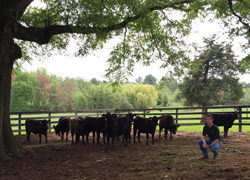In June 2014, Harrison Dudley ‘09 returned to NC State for a position as a clinical veterinarian in the College of Veterinary Medicine’s Department of Population Health and Pathobiology. Recently, he was re-hired into the role of clinical assistant professor of ruminant health management.
“It’s really just a fancy way of saying I work on cows,” he said.
Dudley focuses on herd investigation for the state’s cattle research stations, as well as the Raleigh dairy farm that produces the milk for Howling Cow ice cream. He optimizes production systems primarily centered on reproduction and preventative health measures, and analyzes production problems through the lenses of nutrition, reproduction, or disease. Dudley spends little time in a lab or animal hospital; instead, he’s typically in the field alongside producers, helping them enhance their business.
“I try to take a very holistic approach to my recommendations,” he said, “and think about best outcomes for all involved parties: animal, farmer, and business.”
Dudley grew up in a small town, surrounded by farm animals. Though interested in agriculture from an early age, he entered college uncertain about which field of study to pursue. After a year of exploration, Dudley declared a major in animal science. He cultivated relationships with veterinary medicine professors while working at the university’s farms, and served as an officer of the Pre-Vet Club.
As a Park Scholar, Dudley participated in Service Raleigh and the Krispy Kreme Challenge, took advantage of networking opportunities, and developed lifelong friendships.
“The program encourages you to plan, gives you a lot of freedom, and inspires a lot of creativity,” he said of his Park experience.
Dudley was selected to join the Food Animal Scholars Program, through which he gained admission to NC State’s College of Veterinary Medicine following completion of his undergraduate degree. During his time in veterinary school, he traveled to South America with peers and faculty. They toured agricultural enterprises in Uruguay to learn that nation’s approaches to raising food and fiber animals.
After earning his doctor of veterinary medicine degree in 2012, Dudley accepted a position as an associate veterinarian with Carolina Equine and Food Animal Mobile Vet Services. He practiced there for two years, performing equine and bovine medicine, surgery, and production management for five counties. While the majority of his work was with cattle and horses, Dudley also treated dogs, alpacas, sheep, and even a camel.
Although he misses private practice and his relationships with clients, Dudley enjoys the opportunities his current role affords him to teach and engage professionally at the state level.
Teaching – both undergraduate and veterinary school courses – accounts for half of Dudley’s responsibilities. Most of the time, the field is his students’ classroom. Dudley also conducts outreach to the agricultural community, meeting with producer groups and county livestock groups statewide through NC State’s Cooperative Extension service.
“I really like helping clients realize how they can increase their business, either through animal welfare or improving production,” he said.
When he’s not assisting cattle producers or caring for the Wolfpack’s cows, Dudley spends time with his wife – his high school sweetheart – at their home in Wendell, N.C. They’re proud owners of a dog and “a herd of cats” Dudley has picked up along the way in his veterinary travels, and they are excited to welcome a son to their pack in October.
Story by Maressa Gabriel
posted 2015.08.27

